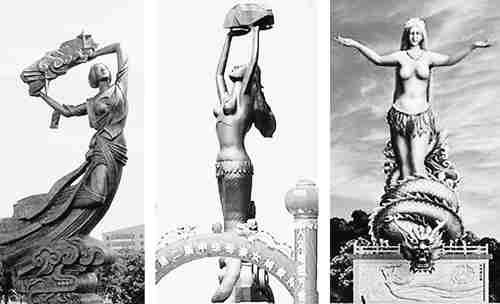Sacrifices offered to ancients for today's economy
By Jeff Pan (chinadaily.com.cn)Updated: 2007-05-29 14:11
Many bureaucrats are in the business long enough to know that a better career is usually dependent on how to impress officials in higher echelons, rather than actually improving the local economy and people's livelihoods.
Recently a number of governmental heads have found that paying respects to ancestors and even some mystical figures is a good way to get more publicity.
|
|
Nuwa remembered across the country
Nuwa, a mythical figure who is said to be able to melt stone and patch the sky was commemorated in Zhushan County of Central China's Hubei Province.
In the sacrificial ceremony held on May 13, saluting canons were fired, and all kinds of sacrifices representing the five elements in ancient Chinese philosophy were also offered. Then, county leaders read a long funeral oration, and local pupils also recited "Ode to Nuwa."
The extravagant ceremony to Nuway, who is also considered the Chinese version of Eve, was said to have cost 15 million yuan (US$ 1.96 million), 15 percent of the annual income of the poverty-stricken county.
When the event caught the attention of the media, it did not receive the applauses officials expected. Instead, many netizens were appalled to learn how much money was spent for the event, considering the financial situation of the county, and many online readers asked why a place like this would hold such an event instead of focusing on economic development.
"It actually cost 7.4 million yuan (US$ 0.96 million)," confirmed a local governmental official surnamed Hu. "In fact you can infer with your common sense - the county's financial income just surpassed 100 million yuan last year. How can we spend 15 million yuan in a sacrifice? We can't afford 15 million even we want to. The reason why some people made the number bigger is just to make it 'look better'."
When asked why a county of such strained economic conditions even bothered to hold a public sacrifice like this, the official replied the move a way to first to expand the "Nuwa cultural influence" of the county, and then to attract investments. "A number of places are advocating 'Nuwa culture' with various activities, so of course we need to fight for a spot, too."
A lot of places including Shexian County in Hebei Province, Tianshui of Gansu Province, and Changzhi County of Shanxi Province have only the slimmest connections with Nuwa and have held sacrificial activities. These places claim they are the spots where Nuwa was born and died.
The Nuwa Culture Research Center was established in Xi'an Lintong District of Northwest China's Shaanxi Province in early May. The research center released 12 different designs for the sculpture of Nuwa for a public referendum and plan to build it in two years. Among many other places, Lishan Mountain in Lintong also claims to be birthplace of Nuwa.
Zhuge Liang still shedding wisdom
Zhuge Liang, a military strategist from the Three Kingdoms period, has also become a popular mythical figure. According to the Shandong Provincial Press Office, Zhuge Liang Culture and Tourism Festival will be held May 29-31 in Linyi of East China's Shandong Province, celebrating Zhuge's 1,826th birthday when people can give sacrifices. Zhuge Liang spent his childhood in Linyi of Shandong Province.
About a month ago, the 1800th Anniversary of Zhuge Liang's Coming out of the Mountain was held in Xiangfan of Hubei Province. Hanzhong of Shaanxi Province also held a week-long public sacrifice ceremony for 1,772nd anniversary of Zhuge Liang's death. Both of the programs were organized in a bid to boost local tourism.
Have no money? Sing and dance!
According to an editorial by Xinhua News Agency, most of the places holding sacrificial ceremonies are relatively less developed. Local officials who hold sacrifices to ancient figures usually want financial payoffs now. However, Xinhua said most of the programs turned out to be a waste of money, and did not serve the purpose of attracting more visitors and investors.
Then why are local officials still obsessed with doing the sacrifices?
According to China Youth Daily, the sacrifices are usually used cover up embarrassing financial situations.
Meanwhile, the sacrificial ceremonies keep local officials busy. Even though
programs like this cost a lot of taxpayers' money, the media will usually cover
them, and local officials may also get attention from those above them in hopes
of higher rewards.
|
||
|
||
|
|

